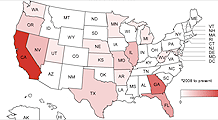Obama weighs new rules for banks
Federal Reserve would play key roles in overseeing systemwide risk, while FDIC would gain power to tackle troubled bank holding companies.
WASHINGTON (Reuters) -- The Obama administration is weighing a plan that would put the Federal Reserve in charge of monitoring systemic risk and give the Federal Deposit Insurance Corp. authority to unwind insolvent bank holding companies, sources familiar with the proposal said on Wednesday.
The idea, which is being circulated to U.S. lawmakers as they embark upon an overhaul of financial regulation, could be announced soon after June 8, the two sources said. They spoke on condition of anonymity because the plan has not been widely shared and cautioned that the plan is not final.
Treasury Secretary Tim Geithner has said the administration will come out with a comprehensive proposal in mid-June. June 8 is the Monday after President Barack Obama returns from a trip to Saudi Arabia, Egypt, Germany and France.
White House spokeswoman Jen Psaki said no final decision had been made about the shape of the regulatory proposal.
"Officials at the White House and the Treasury department are continuing work with Congress on the final phases of a proposal, but there is no final proposal in place and any announcement will not be for a couple of weeks," she said.
The sources said the administration is mulling a consumer protection agency to supervise financial products, such as credit cards and mortgage-related products. Securities would not fall under the consumer supervisor's jurisdiction.
The revamp could also create an agency in charge of investor protection and market integrity, which would likely be a merged Securities and Exchange Commission and Commodity Futures Trading Commission.
Such a move would stop short of trying to eliminate either the SEC, which regulates securities, or the CFTC, which oversees commodity futures, one of the sources said. The new investor protection agency would oversee all investment products, the source said.
The administration will also try to stop banks from shopping for their regulator by creating a new, single government agency to be the hands-on regulator for most banks and insurers, the sources said.
Many financial institutions can currently choose between four bank regulators, creating the opportunity for regulatory arbitrage. The plan being considered would have the new agency be the primary supervisor of state and federally chartered depository institutions, bank holding companies and insurers, according to the sources.
It was not immediately clear what such a plan would mean for the current primary regulators of banks.
Some policymakers have suggested merging the Office of the Comptroller of the Currency, which regulates the nation's largest banks, and the Office of Thrift Supervision, which regulates many mortgage-related financial firms.
The administration is also considering a financial regulatory advisory council, which would include the heads of major financial regulators. This would be similar to the President's Working Group on Financial Markets, which is chaired by the Treasury secretary and composed of the chairmen of agencies like the SEC, the Fed and the CFTC.
"It is important to modernize the system to prevent the financial crisis from happening again," said Scott Talbott, a senior vice president with the Financial Services Roundtable, which represents the largest financial services companies.
The Obama administration has said it wants financial regulatory reform legislation passed by the end of the year. But any overhaul faces difficult turf battles among the agencies who could be stripped of responsibilities and among the congressional committees that oversee the agencies. ![]()



